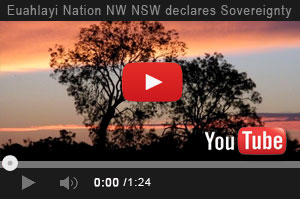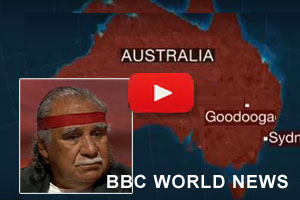Euahlayi People take their fight for their lands to Supreme Court
| 5 May 2014 |
I'm claiming land title. I want to know how they shifted Aboriginal law, Allodial Title from my mob to their common law system. I want to know how they did that.

Euahlayi Head of State, Michael Anderson ... "These fellas here, the problem they got here with this application is I'm claiming it under Aboriginal law, I'm not claiming it under Western law". Image: Geoff Bagnall
By Geoff Bagnall, National Indigenous Times - 16 April 2014
The push for sovereignty and independence by the Euahlayi people of western New South Wales that began with their refusal to pay rates to Brewarrina Shire Council is coming to a head in the New South Wales Supreme Court and if successful would have implications for who actually owns the land right across Australia.
The Euahlayi Head of State, Michael Anderson has attacked the very core, the very foundation of the white colonial settlement of his peoples' country by demanding the New South Wales Government hand over documents which prove their legal right to the land.
And the best part for Mr Anderson is that while he is standing in the white man's court, he said he was making his claim under his traditional law.
Mr Anderson and representatives of the Euahlayi people travelled to Sydney last week to attend a hearing at the Supreme Court on the matter. The Court hearing was to allow the legal team representing the New South Wales Government to submit documents which proved there had been a formal agreement between the Euahlayi people and the State handing ownership of the Euahlayi people's land to the New South Wales Government.
Last week's hearing was adjourned again at the request of the New South Wales Government's legal team because they told the Court they needed more time to find any documents which might prove there had been a formal agreement at some time in the past.
However, Mr Anderson said the New South Wales Government would not find any documents because none actually exist.
The Supreme Court action by the Euahlayi people is part of a range of actions being taken to try and force Australian governments to acknowledge the lands of Australia's First Nations Peoples were stolen as part of the invasion of the country by white colonialists. Mr Anderson and his team has also taken action in the International Court of Justice at the Hague which also challenges the right of Australian governments to hold title over the land in Australia.
Mr Anderson said the Supreme Court was very important. "These fellas here, the problem they got here with this application is I'm claiming it under Aboriginal law, I'm not claiming it under Western law," he said.
"I'm claiming land title. We've been there since time immemorial. I want to know how they shifted Aboriginal law, Allodial Title from my mob to their common law system. I want to know how they did that."
What Michael Anderson and the Euahlayi have done is subpoena the New South Wales State Government in the Supreme Court to produce all documents that show an official transfer of title deeds from the Euahlayi, a declaration of war and a surrender and who officiated on behalf of both parties.
"I asked for all the documents where there was an official transfer of title deeds from my mob, the Euahlayi, to the Crown and on what date, who was there, who on behalf of my people signed them, at what place did it take place, at what time and who represented the Crown," Mr Anderson said.
"I've also asked if there was a declaration of war to show me the document of Declaration of War against the Euahlayi. Then at the end of a war there's a surrender, so I've asked who was present at the surrender, the location, the place."
Mr Anderson said the problem for the New South Wales Government is none of these documents exist.
"We're in a very strong position simply because we've asked for documents they don't have," Mr Anderson said. Because the land of the Euahlayi straddles the New South Wales and Queensland border Mr Anderson has also asked the Queensland State Government for similar documents.
"I've asked the same thing in Queensland and they've already told me they don't have anything," Mr Anderson said. Because of their failure to produce what is in effect their proof of ownership, Michael Anderson said he was fairly confident of his chances of success.
"The Court has got to be satisfied the government has the authority. In my view the Court cannot rule in their favour. "If the New South Wales and Queensland governments cannot produce material that is convincing in terms of Land transfer from my mob then the Brewarrina Shire, and the government, must lose even under their law," Mr Anderson said While Michael Anderson is certain he has logic and right on his side he is not naïve about the power imbalance in the white man's law.
"When I do a reality check I also realise that the courts belong to the system. They were set up by the establishment that stole the land and preside over their laws. "It was said many years ago by my mob 'how can you think you can go into the room of the thief and ask for justice from the fellow who has been appointed to preside over the lie and who has carriage of protecting the right of the thief; do you really believe that you obtain true justice, given these facts'.
"My response now is, I will use this against them in the international political and legal arena which is where I am now going. I will commence an international campaign like Australia has never witnessed before," Mr Anderson said
Michael Anderson and his Euahlayi people come from an ancient culture based on diplomacy between all the mobs extant before 'Australia' even existed.
"We are the true diplomats and despite Australia shielding itself from public and international scrutiny all these years, they can no longer hide," he said.
Mr Anderson points out the government cannot even argue "we bought the country with a handful of beads". "When Cook came here he was two and a half thousand miles away from my mob and he planted the British flag on an island, Possession Island, so they annexed Australia, the mainland of Australia to Possession Island," Mr Anderson said. "There were people on Possession Island and he didn't tell the British that he didn't get consent from them.
"In fact in Cook's journals you will find when he left beads down here near Wollongong, gave them by putting them on the beach, when they came back from the sea the next day to have a look the stuff was still there and the Aborigines were gone. "So they never accepted anything and so there was no transfer at all. There was no transfer of gifts, so they cannot say there was a transfer on an agreement, a consensual arrangement, so they lose their argument there," Mr Anderson said.
It is a complicated case but at its core it is also a very simple one.
Land grants were made in the colonies of Australia under the authority of the English King but Mr Anderson said the King did not have all the relevant information. He had been lied to about the acquiescence of the Aborigines and as such there is~ precedent English law that says the land grants were a fraud and everything arising from that fraud is invalid.
"The implications are pretty clear," Mr Anderson said. "The fact is the invaders never, ever got title to the land and everything that has been going on in Australia since then has been a sham. "And it's been a deceit by fraud and what we've got to show is Australia has been perpetrating a deceit by fraud and unfortunately they ruled over Aboriginal people's lives," he said.
"There was an English law when they settled Australia and three cases have been identified to us where a King makes grants without having all the information placed before him of whether it's right.
"If the King gave orders or grants under his prerogative powers, then he's done it based on a fraud and there's been several English cases where the King's prerogative powers were overturned if it was shown his orders or grants were done by deceit. So the fraud cannot stay, it becomes void, they void everything," he said.
Mr Anderson contends this means all laws in respect of Aborigines are invalid.
"The upshot is that if we are successful in this Court action it throws into question the validity of any laws they ever made over Aborigines. It also raises a hell of a lot of questions about the validity of all those Crown grants, all the land grants in this country and this one that they don't want to deal with. And potentially that includes not only all land grants but all land ownership.
"It does," Mr Anderson said. "You've got to look at the evolution of land title in this country and how it evolved."


